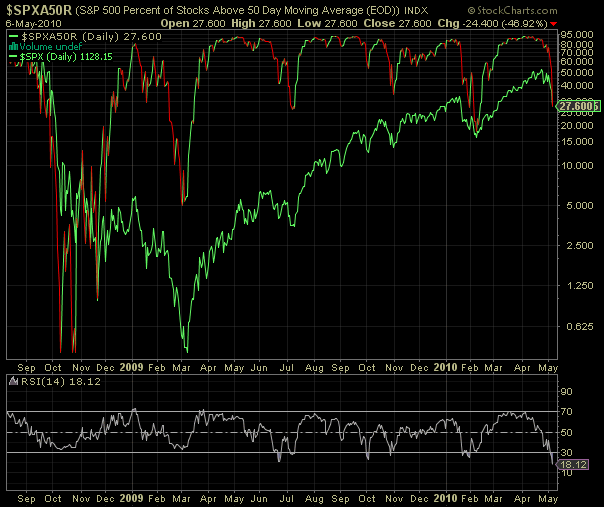For investors, today's market action may have felt like late 2008 or the first quarter of 2009. One aspect of the 2008 and early 2009 market was investors had an opportunity to reassess their comfort level with the potential volatility associated with equities. Many were questioning whether they should be reducing their equity exposure during that time period. If they stayed the course, they were able to recover a large portion of paper losses during the last 15 months.
In the strong market advanced achieved since March of last year, investors need to be cautious in not letting emotions get in the way of sound investment decisions. If an investor was uncomfortable with the market environment in March last year and today were uncomfortable with their investments due to today's 1,000 intraday market decline, then an investor might want to consider lightening up on equities at this point in time keeping in mind equities are a long term investment choice.
As it turned out though, a majority of today's market decline was the result of an erroneous trade. For the trade in question, a trader selling shares of Procter & Gamble (PG) inadvertently entered the shares in billions versus millions. With Procter & Gamble being a Dow component, the 37% drop in P&G's stock contributed about 170 points to the Dow's decline. 3M (MMM) fell over $18 and represented over 140 points in the Dow's decline.
Without a doubt there are some uncertain market events in play at the moment, specifically events in Greece and the potential contagion in the sovereign debt markets. From a fundamental perspective though, the U.S. market does not seem to be extended on a valuation basis. Bottom up 2010 earnings for the S&P 500 Index are estimated at $81.06. This represents a projected P/E ratio for the S&P Index of just under 14. Top down 2010 earnings estimates are $65.37 and equates to a P/E multiple of 17. The market is not cheap, but it is does not appear expensive either.
Below are a couple of charts that display a few technical aspects of the market as it relates to the percentage of S&P 500 stocks that are trading above their 50 day and 150 day moving averages. These percentages have decline quite a bit from a few months ago.
In the strong market advanced achieved since March of last year, investors need to be cautious in not letting emotions get in the way of sound investment decisions. If an investor was uncomfortable with the market environment in March last year and today were uncomfortable with their investments due to today's 1,000 intraday market decline, then an investor might want to consider lightening up on equities at this point in time keeping in mind equities are a long term investment choice.
As it turned out though, a majority of today's market decline was the result of an erroneous trade. For the trade in question, a trader selling shares of Procter & Gamble (PG) inadvertently entered the shares in billions versus millions. With Procter & Gamble being a Dow component, the 37% drop in P&G's stock contributed about 170 points to the Dow's decline. 3M (MMM) fell over $18 and represented over 140 points in the Dow's decline.
Without a doubt there are some uncertain market events in play at the moment, specifically events in Greece and the potential contagion in the sovereign debt markets. From a fundamental perspective though, the U.S. market does not seem to be extended on a valuation basis. Bottom up 2010 earnings for the S&P 500 Index are estimated at $81.06. This represents a projected P/E ratio for the S&P Index of just under 14. Top down 2010 earnings estimates are $65.37 and equates to a P/E multiple of 17. The market is not cheap, but it is does not appear expensive either.
Below are a couple of charts that display a few technical aspects of the market as it relates to the percentage of S&P 500 stocks that are trading above their 50 day and 150 day moving averages. These percentages have decline quite a bit from a few months ago.
 |
 |
For investors then, the sovereign debt issues are certainly events that will continue to impact the markets in the near term. The biggest concern is whether Greece's issues will spill over into other countries like Spain, Italy and Ireland, to name just a few. Investors should keep in mind that it is May and the market is entering a seasonally weak period. Absent of what I think are reasonably sound fundamentals for many high quality U.S. stocks, investors should keep the big picture in mind as it relates to the overall asset allocation for their investment portfolio.

No comments :
Post a Comment